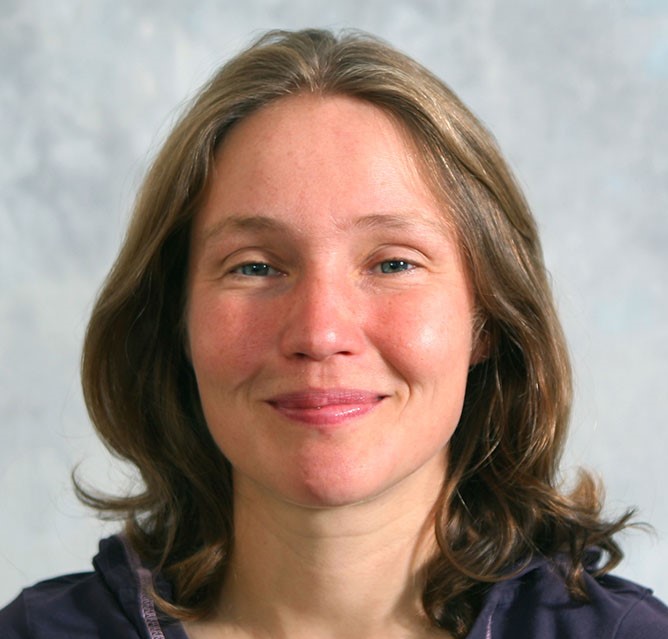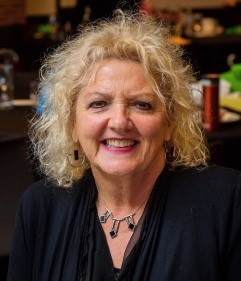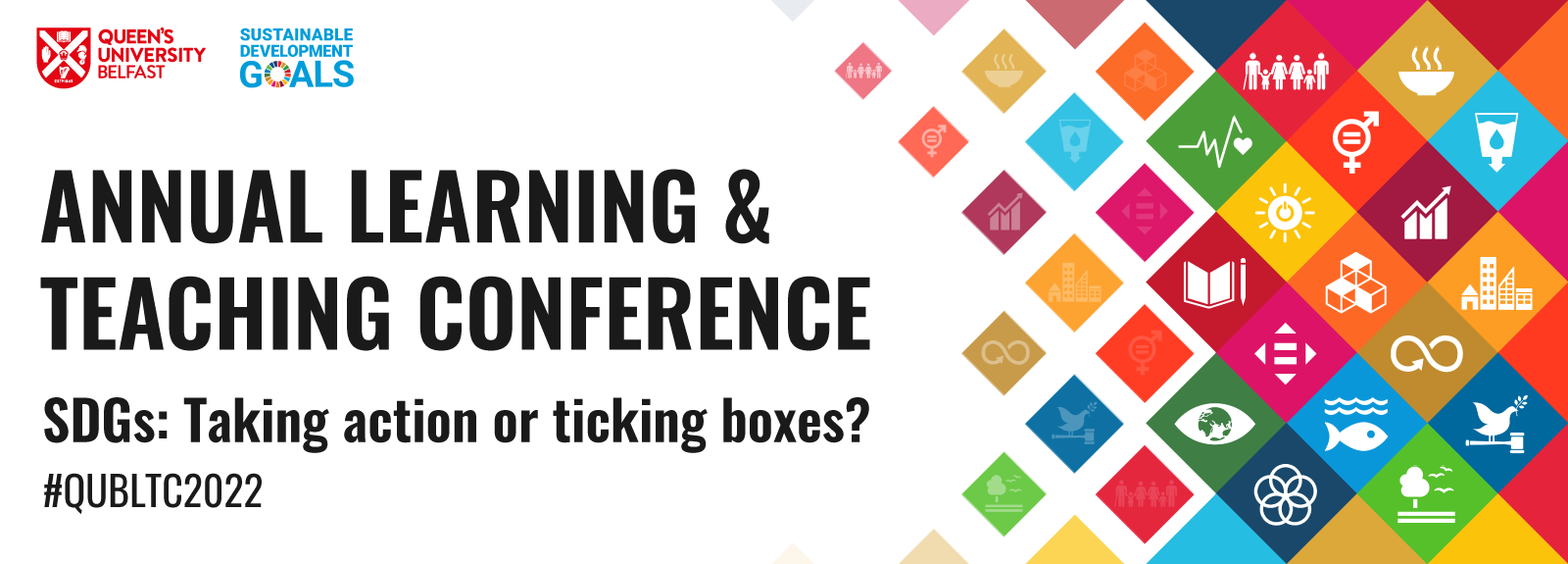The Centre for Educational Development (CED) were delighted to present our Annual Learning and Teaching Conference 2022, entitled: Sustainable Development Goals: Taking action or ticking boxes?
Conference Context
The conference was set against the backdrop of the adoption of the United Nations Sustainable Development Goals (SDGs) in 2015, where Higher Education Institutions (HEIs) promote and encourage educators, learners and communities to engage in the social, economic, and environmental responsibilities both locally and globally. Well before the introduction of the SDGs in 2015, Education Sustainable Development (ESD) was a key part of HEIs for a sustainable future to the development of relevant learner skills, knowledge and competencies but did not always take an institutional commitment or strategic approach. The United Nations Educational, Scientific and Cultural Organisation (UNESCO in 2019) defines Education for Sustainable Development (ESD) as:
ESD empowers learners to take informed decisions and responsible actions for environmental integrity, economic viability and a just society, for present and future generations, while respecting cultural diversity. It is about lifelong learning and is an integral part of quality education. ESD is holistic and transformational education which addresses learning content and outcomes, pedagogy, and the learning environment. It achieves its purpose by transforming society.
There is also considerable evidence that learners expect sustainable development to be embedded into institutional practices, as well as the curricula, as outlined by the National Union of Students (NUS) Skills Survey (2020-2021). The conference is drawn from the QAA and Advanced HE publication on the guidance of Education for Sustainable Development published in 2021, which is the focus of the conference themes.
Conference Themes
The four Keynote Speakers align with the conference themes, that took place over four weeks.
-
23 March: SDGs and Student Partnership and Voice
You can watch the LTC 2022 Day 1 full video here
Programme of Events
Time Presenter Title of Presentation 14:00 Prof Zoe Robinson Response and responsibility: the role of universities, the curriculum and student partnership in a more sustainable future 15:00 Dr Jennifer O'Brien University Living Lab: Transforming the ability of universities to support sustainability transitions through partnership based teaching and learning 15:15 Dr Maryam Malekigorji & Dr Caoimhe Clerkin Student-Staff Partnership Project (Student Centred Learning and Teaching) 15:30 Dr Gary Mitchell, Dr Patrick Stark & Professor Christine Brown Wilson A mixed methods evaluation of a co-designed evidence-based practice module underpinned by a UDL pedagogy Prof Zoe Robinson

Zoe Robinson is a Professor of Sustainability in Higher Education and University Director of the Institute for Sustainable Futures at Keele University where she also held the role of University Director of Education for Sustainability for 10 years with responsibility for embedding sustainability across the curriculum and student experience. Zoe is a researcher, educator and practitioner in the field of sustainability science with a background in sustainability, climate change and energy transition education and community engagement. In recognition of her work in education for sustainability, Zoe was awarded a National Teaching Fellowship in 2012, is a Principal Fellow of the Higher Education Academy (PFHEA) and was shortlisted in the ‘Most Innovative Teacher of the Year’ category of the Times Higher Education Award in 2019. Zoe has worked in an advisory capacity on education for sustainability for a number of national organisations.
Response and responsibility: the role of universities, the curriculum and student partnership in a more sustainable future
This session explores university responses to the urgent action needed to ensure a more sustainable future. Higher Education Institutions have long been recognised as a major contributor to society’s efforts to achieve sustainability, in part through the skills and knowledge that its graduates put into practice.
‘Education for sustainability’ can take many forms, from the formal curriculum we teach, the co-curriculum in the opportunities we provide for students, and the ‘hidden curriculum’, in the learning that occurs from the environment in which we live, work and study. But how do we as educators navigate the tensions and synergies between the drive to ensure employable, high earning graduates, metrics driven league tables, and the responsibility to ensure our students - society’s future leaders - are equipped to become knowledgeable and engaged actors with the skills to educate and influence others, and the agency to enact change?
- 30 March: Health and Wellbeing in the curriculum
You can watch the LTC 2022 Day 2 full video here
Programme of Events
Time Presenter Title of Presentation 14:00 Gareth Hughes
(University of Derby)Student wellbeing and student learning 15:00 Farrah Higgins
(Technological University Dublin)Authentic Assessments: Preparing undergraduate computing students for a new future of Hybrid/Remote working 15:05 Dr Colin McClure & Dr Skye (Xin) Zhao
(Queen's University Belfast and University of Sheffield)Supporting online personal tutoring with gather.town: an innovative approach to foster student belonging 15:10 Dr Laura Michael, Dr Agustina Martire, Sara Lynch (Queen’s University Belfast) & Andrew Grieve (DFI Active Travel Unit) Open Botanic Cycle Strategy: Lessons from engaging with Industry 15:50 10 Minute Discussion Gareth Hughes

Gareth is a psychotherapist, researcher and lecturer. Gareth led the development of Education for Mental Health, a toolkit hosted by Advance HE to support the development and delivery of curriculum that can support wellbeing and learning. He is also the lead author for the University Mental Health Charter and the clinical lead for Student Space, a site hosted by Student Minds to support student mental health during the pandemic. Gareth led the development of The Wellbeing Thesis, an online resource for PGR students, is a Principal Fellow of the HEA and is the author of Be Well, Learn Well, a book for university students published by Bloomsbury.
Session title: Student wellbeing and student learningThe session will explore the relationships between student wellbeing and student learning and how teaching and curriculum development can support both. The session will introduce the Education for Mental Health toolkit, which is hosted by Advance HE. Drawing on evidence gathered for the development of the toolkit, it will explore how evidence informed, pedagogic practice can positively influence student learning and wellbeing through scaffolding, learner development, social integration and taking a learning focussed approach. It will also examine common barriers to wellbeing and learning, the role of the academic in supporting student wellbeing and the relationship between academics and student support services.
- 06 April: Internationalisation
You can watch the LTC 2022 Day 3 full video here
Programme of Events
Time Presenter Title of Presentation 14:00 Professor Elspeth Jones
(Leeds Beckett University)Connecting agendas: the transformational potential of internationalisation 15:00 Taher Hatahet, Ahmed A. Raouf Mohamed, Maryam Malekigorji & Emma K. Kerry
(Queen's University Belfast)Remote learning in transnational education: Engagement with virtual learning environment and student’s perception links to performance in examinations 15:15 Dr Olivia Freeman, Dr Cormac McMahon, Dr Alacoque McAlpine & Dr Lucia Walsh
(Technological University Dublin)Enhancing SDG Literacy through Authentic Assessment Strategies 15:30 Sarah Prince, Leontia Hoy, Julie McEvoy, Marina McLoughlin & Fabiana Fausto McCracken
(INTO Queen's University Belfast and QUB School of Nursing and Midwifery)Taking action on Global Nursing: The sustainable impact of a preparatory course for international Pre-Nursing students Prof Elspeth Jones

Elspeth Jones is Emerita Professor of the Internationalisation of Higher Education, Leeds Beckett University UK, and founding editor of the influential book series, Internationalization in Higher Education (Routledge). She was awarded the inaugural North Star Medal of Lifetime Achievement in Transnational Research (Noam Chomsky Global Connections Awards) and is past recipient of the EAIE Award for Excellence in Research. She hosts a YouTube channel featuring conversations with international educators, and is past Chair of the EAIE’s Expert Community on Internationalisation at Home.
Elspeth’s particular interests revolve around the student experience, from strategic leadership to personal, professional and employability outcomes from international mobility, internationalisation of the curriculum at home and abroad, global citizenship and intercultural competence development, as well as the role of languages in internationalisation. She has worked with a range of organisations including UNESCO, European Commission, European Parliament, International Association of Universities, Nafsa, the International Education Association of Australia, and a range of universities, ministries and other organisations across six continents.
Connecting agendas: the transformational potential of internationalisation
Internationalisation is a term widely used yet understood in many different ways. This presentation will seek to unravel and connect the various agendas encompassed by a broad interpretation of the concept, illustrating the local, national and global dimensions of its transformational potential for our students.
It will be argued that internationalisation of the curriculum; internationalisation at home; global citizenship; education for sustainable development; decolonisation of curricula; social and cognitive justice; equality, equity, diversity and inclusion; are all initiatives closely linked to a sense of ‘globality’, or consciousness of the world as a single place (Robertson, 1992). It will invite participants to reflect on these connections in relation to their own students and curricula.
- 13 April: Equality Diversity and Inclusion (EDI)
You can watch the LTC 2022 Day 4 full video here
Programme of Events
Time Presenter Title of Presentation 14:00 Dr Akile Ahmet
(Eden Centre for Educational Enhancement)The continuum of inclusive education within the dominant structures of UK higher education
15:00 Dr Nicholas Bowskill, Mr David Hall, Ms. Lucy Hutchinson & Ms Melody Harrogate
(University of Derby)Is Belonging Enough? Nostalgia, Mattering and Belonging as a Framework for Inclusive Online Practice in the Pandemic 15:15 Dr Grainne Kearney Clinical - Lecturer (General Practice - Centre for Medical Education), Dr Mairead Corrigan Academic - EDI Lead (Centre for Medical Education), Miss Ariana Axiaq (third year medical student) & Miss Daria Casement (Digital Learning Technologist & E-Learning Team Lead) Introducing Cultural Humility in the Medical Curriculum 15:30 Dr Stephanie Burns, Dr Gülseli Baysu & Dr Elida Cena
(Queen's University Belfast)Examining Multicultural Education in Psychology Higher Education Dr Akile Ahmet

Dr Akile Ahmet is the head of Inclusive Education at the LSE, Eden Centre for Educational Enhancement and leads the LSEs Inclusive Education Action Plan.
Akile’s research background is in Human Geography and Sociology where she has developed innovative and underrepresented research projects on spaces of power and resistance in higher education, and social justice. She has worked on three key research projects in this field: ‘Progression and Diversity of Social Work Students across eight different UK Universities’ and ‘Race in the Academy’ and ‘Decolonisation: meaning and action’. Her most recent ´Who is worthy of these walls? Postgraduate students, UK universities, and institutional racism’ was among the most downloaded from the Area Wiley Online Library website in 2021. Akile has also written on the experiences of black and minority ethnic scholar on diversity policy.
The continuum of inclusive education within the dominant structures of UK higher education
In this presentation I am asking us all who work in universities to seek to understand inclusive education within our own institutional settings and pay attention to the specifics of the university and our students as individuals. I argue that Inclusion and inclusive teaching should mark the beginning of dismantling dominant structures which have been embedded into higher education. Only once we have done this will we be able to begin our conversation on decolonising curricula and practice.
Important information
You can access the pre-recorded sessions and infographics here. All the conference recordings will also be available on the CED YouTube channel.
Please do feel free to share with your colleagues and networks.
Conference Twitter handle: #QUBLTC2022
For further enquiries, please contact: ced@qub.ac.uk
